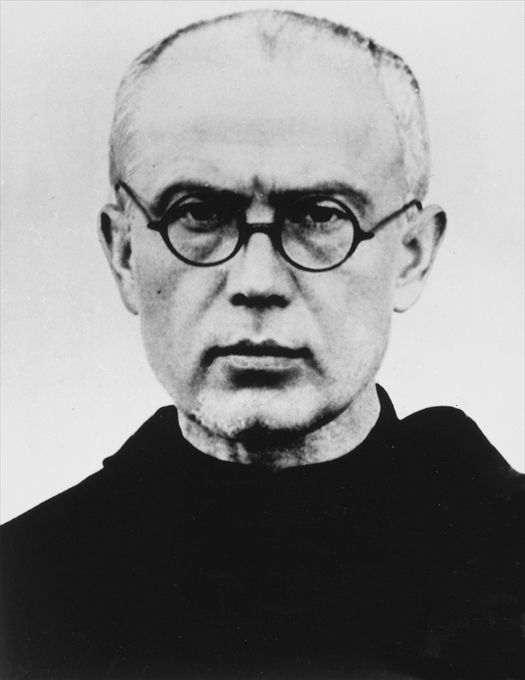Although much of recent writing topics upon the journey and plight regarding persecution within the Church toward what is atypical in spiritual phenomenon or those deemed spiritually different, it is nothing compared to the tremendous persecution that has faced Christians since the beginning of the Church.
The news is filled with the horrible plight of Christians in the Middle East, many of them Catholic Christians but some of Protestant and non-denominational Christian churches. It is horrific and barbarian to think humanity remains caught in murder due to religious differences. [I was going to post a photo, but they are too graphic.]
Today we commemorate the heroic martyrdom of Maximillian Kolbe during World War II. As a Polish Catholic priest, he was considered a threat to the Nazi regime due to his Christian publications. Most of us know of his life and death.
He was imprisoned in a concentration camp. When a man was singled out to be put to death in retribution for another prisoner's escape, the man cried out to be spared as he was a husband and father. Maximillian stepped forward immediately and offered to die in place of the man selected. Why should the Nazi's take Kolbe over this other man? Maximillian Kolbe responded, "Because I am a Catholic priest."
He and some other prisoners were placed in a type of cage in the prison yard in the heat of August and starved to death--no food and no water. Kolbe encouraged his fellow victims with prayer and hymns. As the men died slowly, one by one, Maximillian Kolbe continued to live. The prayers and hymns increased the disdain in the Nazi guards for it was a tremendous witness of Christ to all the prisoners in the camp as word spread of the triumphant joy in Christ in the face of such brutality.
The guards eventually injected the priest in order to kill him. The man he replaced in death went on to live his life and be rejoined to wife and children after he and other prisoners were liberated at the war's end.
Seeing photos of Christian children, kneeling to be beheaded, or of Christian women being shot to death, remind us of the seemingly never-ending plight of non-Christian aggressors, threatened by Jesus Christ alive today in the bodies, minds, hearts and souls of those of us who claim Christ as our Lord and Savior. We take up the cross and follow Him daily, even unto death, death on the cross of persecution small or great, in whatever form and to whatever earthly end we may encounter.
Do those of us who are not put to physical death in physical martyrdom have survivor guilt? Perhaps we should, in some regards. But I think if we grasp that we are part of the Body of Christ, we die with our fellow Christians with each act of aggression and atrocity meted out by those who commit evil--many of them doing so in the name of a god they believe has commanded them to kill those who do not follow their proclaimed religion and religious practices.
In our daily lives, we are called to die to ourselves in various ways and mostly not physically due to martyrdom. But we yet persecute one another in little and large ways, and this must cease if we are to break even a tiny aspect of the cycle of evil, of man's inhumanity to man.
I read that the apostle John, in his later years, always addressed others with the words: Little Children. This was accompanied by his reminder, "let us love one another." The other day I considered using these very words when in conversation with the woman who was becoming flustered over the atypical experience I have during Mass. Such a simple little thing it is--but different and open to such doubt, fear and judgment by others.
I wonder how priests and parishioners or some contractors and workers, would have reacted on several occasions, had I addressed them thus: Little children, let us love one another. I'd like to think that if others addressed me in these words, that I would be moved in the heart and my mind to reflect upon ways in which I have fallen short of the simplicity of child-like love and sweetness to others.
Today in the Gospel reading, Jesus teaches us again about forgiveness--God's for us and how we ought for others. "Forgive from the heart." These Living Words from the Mouth of God stand out to me, now. I have work to do, within, and also to continue being an immolation in whatever sense or way the Lord reveals.
Today I return to the little chapel with the handful of people who come for daily Mass: Little children among little children that we all are, the world over. Let us love one another for Love is of God.



No comments:
Post a Comment